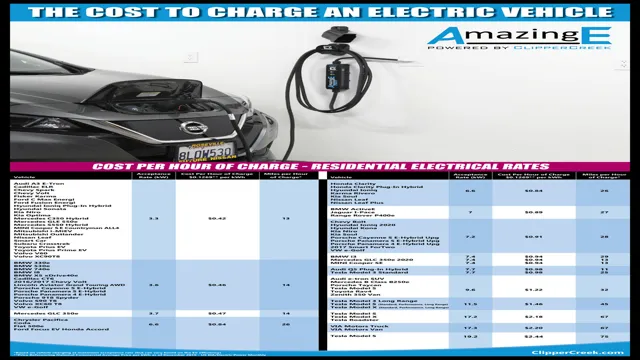Are you considering switching to an electric car but wondering how much it would cost to charge it at home? With the rising popularity of electric vehicles, the cost of charging them at home has become an important consideration for many.
Fortunately, the cost of charging an electric car at home is much lower than fueling a gasoline or diesel vehicle, and it can be done in the comfort of your own garage. In this article, we’ll take a look at the cost of charging an electric car at home, the different charging options available, and how to choose the right one for you.
Factors Affecting Cost
When considering the cost of charging an electric car at home, there are a few factors to take into account. The most significant of these is the cost of the charging unit itself. A wall-mounted or garage-mounted charging unit can range in price from a few hundred dollars up to several thousand, depending on the model and the features included.
The next factor affecting the cost of home charging an electric car is the type of electric power used. If you use a traditional plug-in outlet, the cost will be lower, but the charging speed will be slower. If you opt for a dedicated charging station, the cost will be higher, but the charging speed will be faster.
The third factor to consider is the price of electricity. Depending on the provider, the rate of electricity can vary significantly. Generally, the cost of electricity is cheaper at night, so if you plan on charging your car overnight, you may be able to save some money.
Finally, the cost of home charging an electric car will also depend on the size of the car’s battery. The larger the battery, the more it will cost to charge it. Additionally, if you have a hybrid vehicle, you will need to factor in the cost of gasoline, as hybrids use both electric and gasoline power.
Electricity Rates
Understanding how much it costs to charge an electric car at home is an important part of owning an electric vehicle. Depending on your electricity provider, the cost of charging an electric car can vary significantly. The cost of charging an electric car is usually determined by the amount of electricity used, which can be tracked with a charging station and a smart meter.
Additionally, certain electricity providers may offer special discounts or incentives for electric car owners. Taking all of these factors into account, the cost of charging an electric car can range from a few cents per kWh to more than 10 cents per kWh.

Vehicle Type
When it comes to electric vehicles, one of the most common questions people have is “How much does it cost to charge an electric car at home?” The cost of charging an electric car at home will depend on a number of factors, including the type of vehicle, the local electricity rate, and the amount of time it takes to charge the car. Generally speaking, most electric cars will cost around $50 to $100 per hour to charge, depending on the size of the battery.
Of course, this cost can vary depending on the type of electric car, the local electricity rate, and the amount of time it takes to charge the car. Furthermore, many electric cars come with charging accessories that can help reduce the cost of charging at home.
Ultimately, the cost of charging an electric car at home will depend on a variety of factors, but the cost is typically relatively affordable.

Charging Station Options
An often overlooked aspect of owning an electric car is the cost of charging it at home. While charging at a public station may be convenient, it can be expensive and the cost can add up quickly. Home charging, on the other hand, allows you to refuel at your own convenience and usually at a much lower cost.
But how much does it cost to charge an electric car at home? The answer depends largely on the type of charging station you choose, as well as the cost of electricity in your area. A Level 1 charging station, which uses a standard 120-volt outlet, will cost the least to install, but will take longer to charge your car. Level 2 charging stations, which use a 240-volt outlet, will cost more to install but will charge your car much faster.
Level 3 charging stations, which use a 480-volt outlet, are the fastest and most expensive to install. No matter which type of charging station you choose, you can expect to pay anywhere from a few hundred dollars to a few thousand dollars for the installation. You’ll also need to factor in the cost of electricity, which can vary widely depending on your area.
In general, you can expect to pay anywhere from 10 to 30 cents per kilowatt-hour of electricity to charge your electric car at home.
Estimated Costs
When considering the switch to electric vehicles, one of the main questions people ask is “How much does it cost to charge an electric car at home?” The answer to this question depends on numerous factors, including the type of electric car, the type of charging station, and the cost of electricity in your area. The primary cost associated with charging an electric car at home is the cost of electricity. The cost of this electricity will vary based on the amount of electricity used and the cost of electricity in your area.
Depending on your local electricity provider, you could be paying anywhere from 10 to 30 cents per kilowatt-hour for electricity. In addition to the cost of electricity, there is also the cost of the charging station itself. The cost of a charging station will vary depending on the type of charging station and the features it offers.
Basic charging stations can cost anywhere from $200 to $500, while more advanced charging stations can cost upwards of $2,000. The cost of installation is also an important factor to consider when determining the cost of charging an electric car at home. Depending on the type of charging station, installation can cost anywhere from $100 to $1,000.
Finally, there are also additional costs associated with charging an electric car at home, such as the cost of a home energy management system or an electrician to install the charging station.
In summary, the cost of charging an electric car at home will vary depending on the type of electric car, the type of charging station, the cost of electricity in your area, and the cost of installation. On average, the total cost of charging an electric car at home can range anywhere from $300 to $3,000 or more.
Cost of Charging at Home
Charging an electric car at home can be a convenient and cost-effective way to power your vehicle. Depending on your personal electricity rate, the cost of charging your car can vary. Generally, the cost to charge an electric car is around $1 to $2 per hour of charging, depending on the cost of electricity in your area.
This cost is significantly less than the cost of gasoline, making electric cars a great option for both environmental and financial reasons. Additionally, many electric car owners may be eligible for tax incentives or other discounts that can reduce their already low charging expenses. With the right planning and research, charging an electric car at home can be an affordable and easy way to power your vehicle.
Cost of Charging at Public Stations
Charging an electric car at home is a convenient and cost-effective way to ensure your car is always ready to go. But how much does it cost to charge an electric car at home? The cost of charging an electric car at a public station is an important factor to consider, as it may vary depending on the type of station and your area. Generally speaking, it costs an average of $0.
13/kWh for level 1 and 2 charging, and $0.26/kWh for DC fast charging. However, this cost can vary significantly depending on where you are located and the type of charger.
It’s important to do your research and compare the cost of charging at public stations in your area to find the best bang for your buck.
Conclusion
Charging your electric car at home is not only cost-effective but also convenient. The cost of charging an electric car at home depends on the rate of electricity in your area, the type of charger that you use, and the amount of electricity needed to charge the car. Ultimately, the cost of charging your electric car at home is worth the investment in terms of convenience, cost savings, and environmental sustainability.
So take the wheel and drive towards a more sustainable future!
Frequently Asked Questions (FAQs)
How much does it cost to charge an electric car at home?
The cost of charging an electric car at home can vary depending on factors such as the type of electric car, the electricity rates in your area, and the size of the car’s battery. On average, it can cost around $1 to $2 per hour of charging.
What factors affect the cost of home charging an electric car?
There are several factors that can affect the cost of home charging an electric car, including the cost of the charging unit, the type of electric power used, the price of electricity, and the size of the car’s battery.
What are the different charging station options for home charging?
There are three main types of charging stations for home charging: Level 1 charging stations, Level 2 charging stations, and Level 3 charging stations. Level 1 charging stations use a standard 120-volt outlet, Level 2 charging stations use a 240-volt outlet, and Level 3 charging stations use a 480-volt outlet.
How much does it cost to install a home charging station?
The cost of installing a home charging station can vary depending on the type of charging station and the features it offers. Basic charging stations can cost anywhere from $200 to $500, while more advanced charging stations can cost upwards of $2,000. The cost of installation can range from $100 to $1,000.
Can I save money by charging my electric car at night?
Yes, the cost of electricity is generally cheaper at night. If you charge your electric car overnight, you may be able to save some money on your charging costs.
Are there tax incentives or discounts available for home charging an electric car?
Yes, there are often tax incentives or discounts available for electric car owners. Be sure to check with your local government or utility provider to see what incentives are available in your area.
How does the size of the car’s battery affect the cost of charging at home?
The size of the car’s battery will impact the cost of charging at home. The larger the battery, the more energy it will require to charge, which can increase the cost of charging.
Is home charging more cost-effective than charging at public stations?
Generally, home charging is more cost-effective than charging at public stations. The cost of charging at public stations can vary, but it is often more expensive than charging at home. However, charging at public stations can be more convenient when you’re on the go and away from home.

I am James Beaupre, the founder of batteryvehicleprice.com. With a deep-rooted passion for vehicle batteries, I have dedicated my career to exploring and understanding the intricacies of this crucial technology. My website aims to provide valuable insights and information on battery-powered vehicles, empowering individuals to make informed decisions.
